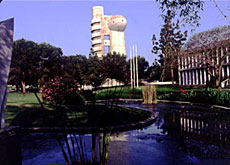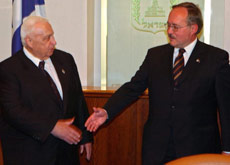Closer science ties with Israel raise hackles

Swiss Interior Minister Pascal Couchepin is heading to Israel on Wednesday in a bid to reinforce scientific cooperation with the country.
But there are fears that dealing with the Israelis could undermine Switzerland’s standing in the Middle East.
Couchepin hopes to sign a formal declaration of intention with the Israelis during his four-day trip and make up for a lack of any agreement on research between Switzerland and Israel.
“It’s not an accord, but it will be a kind of road map for future cooperation,” said Claudio Fischer, head of international science policy at the interior ministry.
Politics, always a contentious issue when Israel is involved, will not play a role, according to Fischer.
“We are concentrating on research cooperation and we have seen there is an obvious interest for that type of cooperation from scientists in both countries,” he told swissinfo. “We support that because it can benefit both parties involved.”
But not everyone agrees. Daniel Vischer, president of the Switzerland-Palestine Association, says he is against any kind of accord with the Israelis.
Inopportune
“I feel it is inopportune,” he told swissinfo. “Israel is still an occupying power in the Palestinian territories despite United Nations resolutions calling for its withdrawal.”
Vischer, who is also a Green Party parliamentarian, adds any accord with Israel would damage Switzerland’s standing as a go-between in the Middle East.
“Switzerland should treat both sides the same way,” he said. “Couchepin and Defence Minister Samuel Schmid are undermining our foreign policy by seeking cooperation with the Israelis.”
The defence ministry recently announced it would buy communications systems from Israel, much to the displeasure of some members of parliament.
There have been calls to boycott Israeli products in Switzerland, although so far no one has considered research or education an issue.
The Swiss authorities consider actions, such as a recent short-lived boycott of Israeli universities by British tertiary institutions, as counterproductive. The foreign ministry points out that most Israeli scientists are critical of their government’s actions in the occupied territories.
Switzerland’s relationship with Israel has not always been smooth in recent times. Tel Aviv has found cause to complain because the Swiss government has called on Israel to respect the Geneva Conventions in the Palestinian territories and lent its support to the private Geneva Accord.
Despite that Couchepin will be the third minister to travel to Israel this year after Schmid and Foreign Minister Micheline Calmy-Rey.
Little collaboration
“This trip will help decide what fields we should focus on, but certainly biotechnology, medicine, life sciences and information technology are of interest [for a future accord],” said Fischer.
Israeli scientists are considered to be among the best in these fields. The Swiss authorities hope that an initial declaration, along with subsidies for projects or exchange programmes, will help boost collaboration between the two countries.
According to a Swiss foreign ministry report, scientific papers co-authored by Israeli and Swiss scientists are few and far between.
“Israel has excellent universities and some of our universities already cooperate with them,” said Fischer. “What we want to do is find out whether this cooperation needs a more formal grounding.”
The Federal Institute of Technology in Zurich is one of the few schools in regular contact with Israel. It has had a collaboration agreement with the Weizmann Institute of Science near Tel Aviv since 1971.
swissinfo, Scott Capper
Switzerland recognised the state of Israel in 1949.
Switzerland imported goods and services worth SFr413.7 million ($330 million) from Israel last year, while exports there were valued at SFr659.7 million.
The two countries have had a free trade agreement since 1993 within the framework of the European Free Trade Association.
In 2003, Switzerland was Israel’s fifth biggest foreign supplier.

In compliance with the JTI standards
More: SWI swissinfo.ch certified by the Journalism Trust Initiative


You can find an overview of ongoing debates with our journalists here. Please join us!
If you want to start a conversation about a topic raised in this article or want to report factual errors, email us at english@swissinfo.ch.